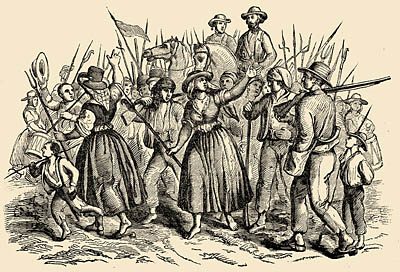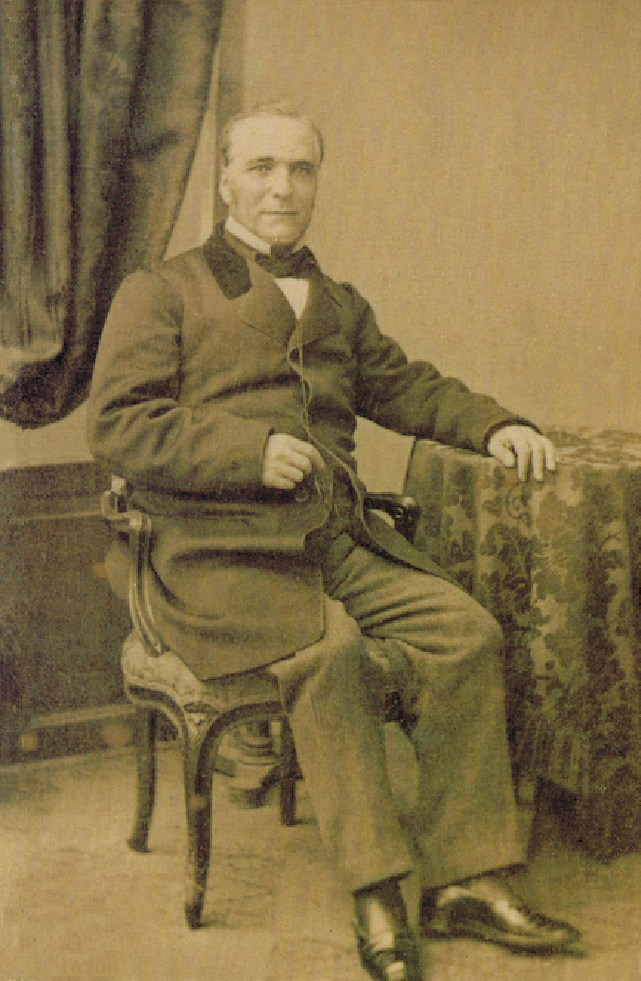|
Patuleia
 The Patuleia, Guerra da Patuleia, or Little Civil War was a civil war in Portugal in 1846-47, so called to distinguish it from the 'great' civil war between Pedro IV of Portugal, Pedro IV and Miguel I (1828-1834). The Patuleia occurred after the Revolution of Maria da Fonte, and was closely associated with her. It was caused by the nomination, as a result of the palace coup of 6 October 1846, known as the "Emboscada (historical event), Emboscada", to set up a clearly Cartista government presided over by marshal João Francisco de Saldanha Oliveira e Daun, 1st Duke of Saldanha, João Oliveira e Daun, Duke of Saldanha.
The war lasted eight months, pitting the Cartistas (with the support of Queen Maria II of Portugal, Maria II) against an unnatural coalition of Septembrism, Septembrists and Miguelists. The f ...
The Patuleia, Guerra da Patuleia, or Little Civil War was a civil war in Portugal in 1846-47, so called to distinguish it from the 'great' civil war between Pedro IV of Portugal, Pedro IV and Miguel I (1828-1834). The Patuleia occurred after the Revolution of Maria da Fonte, and was closely associated with her. It was caused by the nomination, as a result of the palace coup of 6 October 1846, known as the "Emboscada (historical event), Emboscada", to set up a clearly Cartista government presided over by marshal João Francisco de Saldanha Oliveira e Daun, 1st Duke of Saldanha, João Oliveira e Daun, Duke of Saldanha.
The war lasted eight months, pitting the Cartistas (with the support of Queen Maria II of Portugal, Maria II) against an unnatural coalition of Septembrism, Septembrists and Miguelists. The f ...
[...More Info...] [...Related Items...] OR: [Wikipedia] [Google] [Baidu] |
Revolution Of Maria Da Fonte
The Revolution of Maria da Fonte, or Revolution of the Minho, is the name given to a popular revolt in the spring of 1846 against the Cartista government of Portugal (presided over by António Bernardo da Costa Cabral, 1st Marquess of Tomar). The revolt resulted from social tensions remaining from the Liberal Wars, exacerbated by great popular discontent generated by new military recruitment laws, fiscal alterations and the prohibition on burials inside churches. It began in the area of Póvoa de Lanhoso (Minho) by a popular uprising that little by little extended to the whole north of Portugal. The instigator of the initial riots was a woman called Maria, native of the freguesia of Fontarcada, who would become known by the nickname of Maria da Fonte. As the initial phase of the insurrection had a strong female element, she ended up giving her name to the revolt. The uprising afterwards spread to the remainder of the country and provoked the replacement of the government of ... [...More Info...] [...Related Items...] OR: [Wikipedia] [Google] [Baidu] |
Cabralism
Cabralism is the period from 1842 to 1846 when António Bernardo da Costa Cabral dominated Portuguese politics. Cabralism was characterized by the adoption of the constitutional doctrine contained in the restored Constitutional Charter of 1826, which was taken as a dogma to be scrupulously respected, thus creating a stable framework that was exploited by the government. The government was characterized by being a strong executive, decisively supported by the royal powers enshrined in the Charter, especially the reserve power vested in the sovereign. History With the express support of Queen Maria II, of whom Costa Cabral was considered a valedictorian, the government's parliamentary front was secured by an obedient majority, congregated in an exclusivist party and committed to maintaining, against the onslaughts of the left and the remnants of Miguelism, the order deemed necessary for the country's development. One of the first reforms of Cabralism was administrative centr ... [...More Info...] [...Related Items...] OR: [Wikipedia] [Google] [Baidu] |
Emboscada (historical Event)
The Emboscada ( Portuguese - Ambush) was a palace coup of 6 October 1846, by which queen Maria II deposed the government presided over by Pedro de Sousa Holstein, 1st Duke of Palmela, that had been installed on 20 May that year as a result of the Revolution of Maria da Fonte. By thus dismissing the government of Palmela, that had only come to power 5 months earlier, and replacing it with a Cartista government (described as government of the Cabrais without Cabral) presided over by João Francisco de Saldanha Oliveira e Daun, 1st Duke of Saldanha, the monarch rekindled the revolt and precipitated the civil war known as the Patuleia The Patuleia, Guerra da Patuleia, or Little Civil War was a civil w .... References 1846 in Portugal Conflicts in 1846 Cabralism {{Portugal-hist-stub ... [...More Info...] [...Related Items...] OR: [Wikipedia] [Google] [Baidu] |
Cartista
Cartista was a Portuguese ideology which arose after the Portuguese Liberal Revolution of 1820. Members supported the Constitutional Charter of 1826 granted by Peter IV of Portugal, which was an attempt to reduce the conflicts created by the revolution. This was a less radical charter than the Constitution of 1822. Portuguese Chartism was quite different from both European and British Chartism, and was in some ways antithetical, as they believed in a liberal-conservative ideology. A scathing contemporary description defined them as either personal enemies of Dom Miguel, or were simply acting out of self-interest. By 1851, the Chartists successfully carried out a military coup against Costa Cabral. The party became part of a power-sharing agreement with Partido Progressista, which became the basis of the system of "rotativism", where they took turns ruling Portugal Background Following the Peninsular War, when the monarchy had remained transplanted in Brazil and continental Po ... [...More Info...] [...Related Items...] OR: [Wikipedia] [Google] [Baidu] |
Wars Involving Portugal ...
The following is a list of wars involving Portugal. County of Portugal (868–1139) Kingdom of Portugal (1139–1910) First Portuguese Republic (1910–1926) Second Portuguese Republic (1933–1974) Portugal (1974–present) See also * Military history of Portugal Notes References Further reading * {{Europe topic, List of wars involving, title=Lists of wars involving European countries * * Portugal Wars Wars War is an armed conflict between the armed forces of State (polity), states, or between governmental forces and armed groups that are organized under a certain command structure and have the capacity to sustain military operations, or betwe ... [...More Info...] [...Related Items...] OR: [Wikipedia] [Google] [Baidu] |
Convention Of Gramido
The Convention of Gramido was an agreement signed on 29 June 1847, in the Casa Branca (White House) of Gramido, in Valbom, Portugal. It marked the conclusion of the Patuleia, a civil war between the Septembrism, Septembrists and the Cartista, Cartistas. The Convention was signed by the commanders of the Spanish Empire, Spanish and British Empire, British forces acting under the 1834 Quadruple Alliance, Quadruple Alliance, the representative of the Portuguese government in Lisbon, and representatives from the Junta in Porto. The agreement ended the conflict on terms that, while conciliatory in tone, solidified the Cartistas' victory and strengthened the position of Maria II of Portugal, Queen Maria II's government. The agreement The Convention was signed by representatives from the warring parties and allied powers. Lieutenant General Manuel de la Concha and Colonel Buenaga represented Spain, while Colonel Wilde acted on behalf of the United Kingdom. The Portuguese government was re ... [...More Info...] [...Related Items...] OR: [Wikipedia] [Google] [Baidu] |
Torres Vedras
Torres Vedras () is a concelho, municipality in the Portugal, Portuguese district of Lisbon (district), Lisbon, approximately north of the capital Lisbon. It is a strong agricultural region thanks to its vineyards, and has an intense commercial and industrial life. It is a strong agricultural region linked to its vineyards, and has an intense commercial and industrial life. It is part of the Intermunicipal communities of Portugal, intermunicipal community Oeste (intermunicipal community), Oeste and the region Oeste e Vale do Tejo. The population was 83,075, in an area of . History In 1148, Afonso I of Portugal, Afonso I took the town of Torres Vedras from the Moors, in the then region of Estremadura Province (1936-1976), Estremadura, an area encircled by gentle hills and valleys. King Afonso III of Portugal, Afonso III conceded a foral (''charter'') in 1250, which was later confirmed by King Manuel I of Portugal, Manuel I in 1510. This latter decree conferred on the town many ... [...More Info...] [...Related Items...] OR: [Wikipedia] [Google] [Baidu] |
Civil Wars Of The 19th Century
Civil may refer to: *Civility, orderly behavior and politeness *Civic virtue, the cultivation of habits important for the success of a society *Civil (journalism) ''The Colorado Sun'' is an online news outlet based in Denver, Colorado. It launched on September 10, 2018, to provide long-form, in-depth coverage of news from all around Colorado. It was started with two years of funding from blockchain ventu ..., a platform for independent journalism * Civil (surname) See also * {{Disambiguation ... [...More Info...] [...Related Items...] OR: [Wikipedia] [Google] [Baidu] |
1846 In Portugal ...
Events in the year 1846 in Portugal. Incumbents *Monarch: Mary II *Prime Ministers: António Bernardo da Costa Cabral, 1st Marquis of Tomar; Pedro de Sousa Holstein, 1st Duke of Palmela; João Carlos Saldanha de Oliveira Daun, 1st Duke of Saldanha Events *6 October – Emboscada (palace coup) *19 November – Banco de Portugal established Arts and entertainment Sports Births *21 March – Rafael Bordalo Pinheiro, artist, comics creator (d. 1905). *5 November – Joaquim Pimenta de Castro, military officer, mathematician and politician (died 1918) Deaths References {{Year in Europe, 1846 1840s in Portugal Years of the 19th century in Portugal Portugal Portugal, officially the Portuguese Republic, is a country on the Iberian Peninsula in Southwestern Europe. Featuring Cabo da Roca, the westernmost point in continental Europe, Portugal borders Spain to its north and east, with which it share ... [...More Info...] [...Related Items...] OR: [Wikipedia] [Google] [Baidu] |


